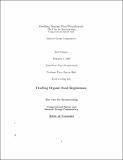| dc.description.abstract | The scope of the organic food debate has embroiled more constituents than simply consumers and producers of organic food. At each step along the way various interest groups such as small organic farmers, private organic certifiers, politicians, international community members, large agri-business lobbyists, environmental groups, consumers and general taxpayers have all added their voices to the debate. The USDA and other parties instrumental to the ongoing drafting of regulations for the National Organic Program have the formidable task of coming up with a cohesive, prudent, and enforceable regime for the organic industry. The original timetable for the implementation of organic regulations has long since been proven to be unrealistic. Now that we are over nine years into the drafting process, the time has come to finally synthesize the divergent comments into a workable set of regulations. Unfortunately, the momentum of the USDA’s bureaucratic machinery has nearly slowed to a stand-still, and the once polarized constituent groups have become even further polarized and unwilling to compromise. Recognizing the current state of affairs and hoping to add a unique overview approach to the debate, the purpose of my paper is four-fold. First, I attempt to provide an accurate and comprehensive overview of the substance of the Organic Foods Production Act of 1990, the recommendations of the National Organic Standards Board, and the National Organic Program’s Proposed Rule (issued in December, 1997). Second, I track various interest groups throughout this process and discuss their public reactions to each of these three important stages. Third, I synthesize the comments generated by each action and attempt to glean common themes and suggestions for moving forward. Fourth, by undertaking a rigorous academic overview of the many divergent and unique voices in the organic debate in this manner, I formulate my own suggestions on how best to advise the USDA to put differences behind it and to move forward. | en |


